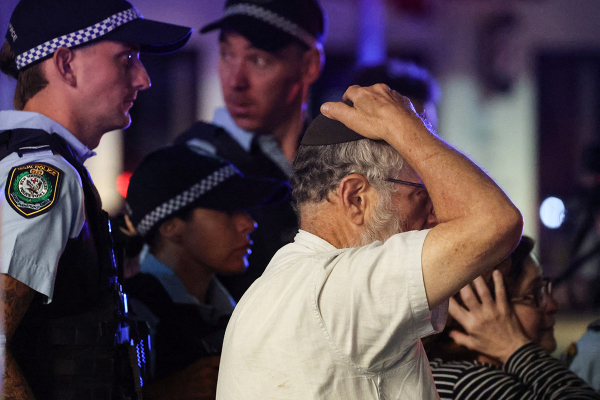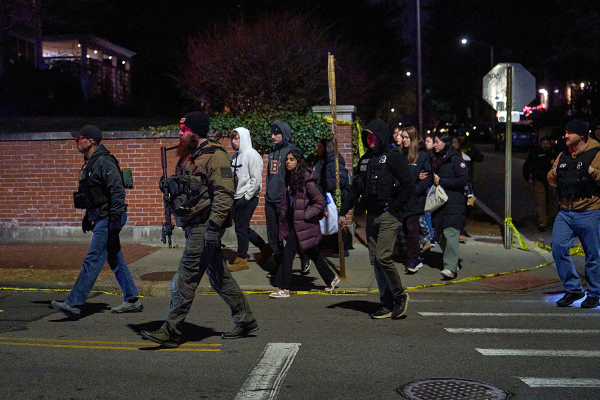2020 Dems talk decriminalizing border crossings, bolstering abortion access in first debate

Political differences emerged Wednesday night as 10 Democrat presidential candidates squared off on a variety of issues ranging from decriminalizing illegal border crossings to universal health care during the party’s first debate of the election season
While the Democratic Party is largely seen as the more ideologically united of the two major American political parties, some cleavages became noticeable in the two-hour debate in Miami televised on MSNBC, NBC and Telemundo.
The debate featured popular Massachusetts Sen. Elizabeth Warren, New Jersey Sen. Cory Booker, New York City Mayor Bill de Blasio, former Obama Housing and Urban Development Secretary Julian Castro, Sen. Amy Klobuchar of Minnesota, Rep. Tulsi Gabbard of Hawaii, former Rep. Beto O’Rourke of Texas, Gov. Jay Inslee of Washington, Rep. Tim Ryan from Ohio and former Rep. John Delaney of Maryland.
Another 10 candidates will be featured in the second part of the debate Thursday night.
Immigration
As immigration has been one of the most hotly contested issues during President Donald Trump’s presidency, the network spent some time focusing on how the Democrats would solve the immigration crisis.
The 44-year-old Castro, a former mayor of San Antonio, Texas, challenged all of his counterparts in the primary to support the repeal of section 1325 of Title 8 of the United States Code, which makes it a criminal act for undocumented immigrants to enter the U.S. at unauthorized entry points.
He mentioned this upon the reference of the shocking image that emerged this week showing the bodies of a migrant father and his daughter who drowned in the Rio Grande trying to cross the U.S. southern border.
“My plan also includes getting rid of Section 1325 of the Immigration and Nationality Act, to go back to the way we used to treat this — when somebody comes across the border, not to criminalize desperation, to treat that as a civil violation,” Castro said. “We see all of this horrendous family separation. They use that law, section 1325, to justify under the law separating little children from their families.”
Castro went on the offensive after fellow Texan, O’Rourke, vowed that his administration would not detain families fleeing violence.
O’Rourke, who lost to Republican Ted Cruz in the 2018 Texas senate race, stated that he would implement a family case management program for families fleeing the world’s deadliest countries.
O’Rourke had previously expressed concern with the idea of repealing section 1325 due to concerns about having a “legal mechanism” to criminalize human and sex trafficking.
“Some of us on this stage have called to end that section, to terminate it. Some, like Congressman O’Rourke, have not,” Castro said. “I want to challenge all of the candidates to do that. I think it is a mistake. If you truly want to change the system, then you have to repeal that section. If not, then it might as well be the same policy.”
O’Rourke pushed back stating that he helped to introduce legislation to ensure that those seeking asylum and refuge in the U.S. are not criminalized.
But Castro continued to press by stating that many migrants who come to the U.S. are not always seeking asylum.
Castro also criticized O’Rourke’s concerns about repealing section 1325, arguing that there are other laws on the books that criminalized human trafficking.
“I think you should do your homework on this issue,” Castro said.
Klobuchar was asked to respond with her thoughts on Castro’s plan to make it a civil violation for undocumented immigrants to cross the border.
“I am happy to look at his proposal but I do think you want to make sure that you have provisions in place that allow you to go after traffickers and allow you to go after people who are violating the law,” she said.
Klobuchar explained that her goal would be to revitalize and expand an immigration reform bill that passed the Senate in 2013 with the support of some Republicans, which would provide a pathway to citizenship for millions of undocumented immigrants.
Ryan weighed in saying that he agreed with Castro’s plan.
“I think there are other provisions in the law that will allow you to prosecute people for coming over here if they are dealing in drugs and other things,” Ryan said. “That is already established in the law. There is no need to repeat it.”
Healthcare
While many Democrat candidates in 2020 are supportive of some idea of universal health care, not all were as supportive as Warren and de Blasio of eliminating options for Americans to seek private health insurance under a “Medicare for All” policy.
Warren was asked why she is supportive of fellow candidate Bernie Sanders’ Medicare for All plan that would essentially put all Americans on Medicare and eliminate private care plans.
“One of the No. 1 reasons is the cost of health care, medical bills. That is not just for people who don’t have insurance. It's for people who have insurance. Look at the business model of the insurance company. It is to bring in as many dollars as they can in premiums and pay out as few dollars as possible for your health care,” she explained.
“That leaves families with rising premiums, rising co-pays and fighting with insurance companies to try to get the health care that their doctors say that they and their children need. Medicare for All solves that problem. I understand there are a lot of politicians who say it is just not possible, we just can’t do it, there are a lot of political reasons for this. But what they are really telling you is they just won’t fight for it. Healthcare is a basic human right and I will fight for a basic human right.”
Klobuchar is in favor of an incremental approach in which Americans have the option to chose a private care plan or choose a government plan.
“I am simply concerned about kicking half of America off of their health insurance in four years, which is exactly what this bill says,” Klobuchar asserted.
O’Rourke said that his plan would make sure that all uninsured people or those who are “insufficiently insured” are enrolled in Medicare
“But if you are a member of a union that negotiated for a health care plan that you like because it works for you and your family, you are able to keep it,” O’Rourke added.
De Blasio chimed in saying that “private insurance is not working for tens of millions of Americans” because of rising co-pays, deductibles, premiums, and out of pocket expenses.
“It is not working,” he said.
O’Rourke responded: “For those for whom it is not working, they can choose Medicare.”
Abortion
While talking about the health care issue, Inslee transitioned the conversation to the issue of abortion. The governor of liberal Washington state said that health insurance companies should not have the ability to deny a woman coverage of abortion.
Religious freedom advocates have fought for years against a former Obamacare policy that required faith-based employers to fund health plans that include abortion even though such plans violate their religious convictions.
“I am the only candidate here who has passed a law protecting a woman’s right to reproductive health insurance,” he said. “I am the only candidate who has passed a public option. I respect everybody’s goals and plans here but we do have one candidate who has actually advanced the ball. We got to have access for everyone.”
Inslee’s response drew ire from other panelists, including Booker, who called it a “false claim.”
“I just want to say there are three women up here who have fought pretty hard for a woman’s right to choose,” Klobuchar stated.
As all the candidates on stage support abortion, or what Democrats refer to as a “woman’s right to choose,” Castro, who supports a single-payer health care policy, was asked specifically if his health care policy would cover abortion.
Under U.S. law, federal dollars are not allowed to fund abortions. A number of 2020 Democrat candidates have voiced support for a repeal of the Hyde Amendment, a budget provision outlawing taxpayer funding of abortion.
“Yes it would,” Castro responded. “I don’t believe only in reproductive freedom. I believe in reproductive justice. What that means is just because a woman — or let’s also not forget someone in the trans community, a trans female — who is poor, that doesn’t mean they shouldn’t have the right to exercise that right to choose. I would cover that right to have an abortion.”
Castro likely meant to say "trans male," since a trans female is a biological male and unable to get pregnant. The audience seemed to miss the flub however, as they cheered the answer.
Castro went on by saying that a “woman’s right to choose is under assault” in America today because states like Missouri, Alabama and Georgia have recently passed laws restricting abortion.
“I would appoint federal judges to the bench that understand the precedent of Roe v. Wade and will respect it,” Castro explained. “In addition to that, we make sure that we fight hard for our health care system transition to one where everybody can get and exercise that right.”
Warren, who released an action plan calling for federal statutory rights that parallel the Supreme Court’s 1973 ruling legalizing abortion nationwide, commented that it “is not enough to expect the courts to protect us.”
“Forty-seven years ago, Roe v. Wade was decided and we’ve all looked to the courts all that time,” she said. “State after state has undermined Roe, put in exceptions, has come right up to the edge of taking away protection. We now have an America where most people support Roe v. Wade, we need to make that federal law.”
Follow Samuel Smith on Twitter: @IamSamSmith
or Facebook: SamuelSmithCP





















